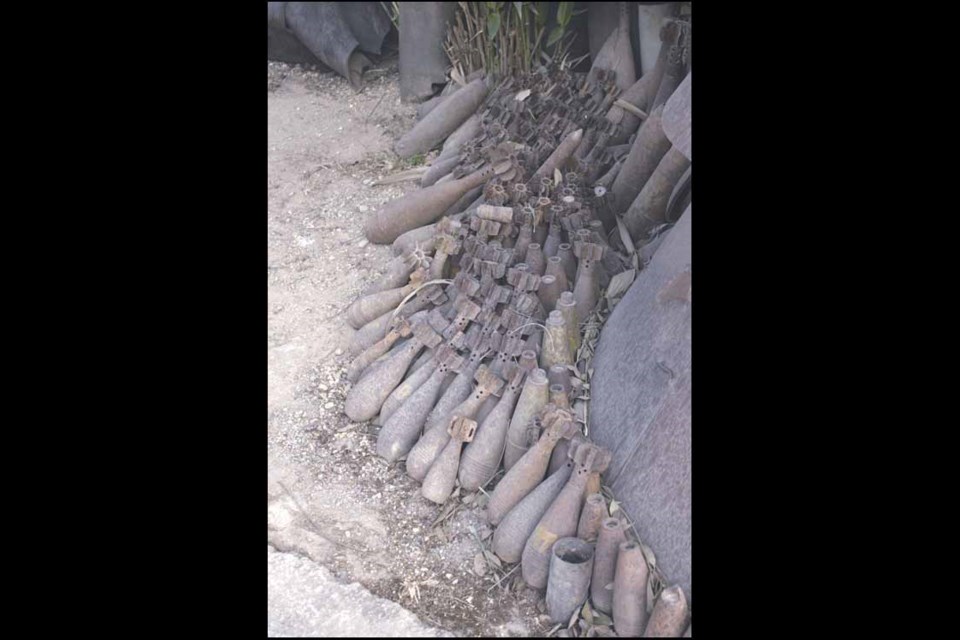When you enter Thailand by air, you're granted a 30-day tourist visa for no charge. This visa can be extended at various government offices around the country for a price, though most people tend to do a "Visa Run" by leaving the country for a short time and re-entering to obtain another one for free. This is how I found myself on a slow boat, floating down the Mekong River, making my way to Laos.
Laos is an interesting country. Compared to Thailand, its poverty levels are drastically higher. While Thailand has had the economic boost of their ever-developing tourism industry, Laos is only starting to attract attention from travelers. The country is covered in fertile farmland, sky-brushing mountains, and long lazy rivers which are used as a main mode of transport. Unfortunately, this beautiful land has been contaminated by huge amounts of UXO, or Un-exploded Ordinance, dropped illegally by the United States, during the Vietnamese war.
Per capita, Laos is the most heavily bombed country in the world. From 1964 to 1973, the United States dropped 2.2 million tonnes of explosives on the neutral country, breaking Geneva Convention Codes. Our southern ally did this to disrupt what they believed to be Vietcong supply routes that utilized the Ho Chi Minh trail. Adding to the brutality and seemingly socially-oblivious violence that occurred, many bomber pilots on-route to Vietnam would empty their deadly cargo over Laotian fields when bad weather wouldn't permit them to enter Vietnamese airspace because the danger of landing with these bombs was deemed too great by the U.S. government. This is an interesting example into the wartime views that a few soldiers' lives were much more important than the lives of the innocent farmers and villagers on the ground - a view that could be argued is shared by many countries around the world to this day.
One third of the bombs dropped failed to detonate on impact and now sit in the ground waiting for someone - anyone - be it a farmer working his rice field to feed his family, or young children playing in the forest - to make one wrong step and instantly have their bodies torn apart by the cluster bombs awakened from their slumber. These same cluster bombs are illegal in over 100 countries worldwide due to their anti-personal effects. These bombs are designed to maim or injure, instead of kill, in order to increase the cost of care to the "soldier's" country of origin.
But, just as in many areas of great suffering, human beings find a way to overcome and live through the hardships they face, sometimes in unusual ways. I had the opportunity to visit what the locals called the "Spoon Village". Here the residents collect defused bombs and melt down the aluminum parts to make spoons, chopsticks, bracelets and other items to sell. I met a family who did just this. I took a tour of their backyard foundry where they make their products. They build their own molds out of the ashes of the fire, then fill them with molten aluminum. It's taken many years to be able to achieve the level of skill they've developed but the end product holds much more character than the automated, assembly line-made utensils we buy at home. They told me about how they've been able to put their two daughters through school and how one is currently studying medicine in university thanks to their ingenuity. After a few shots of their home brewed Lao-Lao I couldn't say no to a freshly-made pair of chopsticks made from once-deadly aluminum to take home.
Also emerging out of the war-torn past are various organizations that have arisen to help de-mine the country. I visited the MAG (Mine Advisory Group) office in the city of Phonsavan, where I learned about the efforts to help clean Laos of UXO. The group employs locals, educates the public, and works with the government to help make the country a safer place. From April, 2007, to May, 2011, MAG cleared 23,778,512 m2 of suspect land in Lao, destroying 145,000 items of UXO. After clearing an area, a stone marker with a white side to indicate safe zones, and a MAG side to indicate live, dangerous areas, is left behind to stop further carnage.
Though this country may not be on the top of your vacation list, the people, places, and experiences waiting for you here will stay with you for the rest of your life.
If you're interested in learning more about MAG, UXO, or wish to donate, visit http://www.maginternational.org/donate/.


.png;w=120;h=80;mode=crop)

